To Save Everything, Click Here
Evgeny Morozov (2013)
 In the very near future, technological systems will allow us to make large-scale and sophisticated interventions into many more areas of public life: politics, culture, public debate, even our definitions of morality and human values. But how will these be affected once we delegate much of the responsibility for them to technology? The temptation of the digital age is to fix everything—from crime to corruption to pollution to obesity—by digitally quantifying, tracking, or gamifiying behavior. But when we change the motivations for our moral, ethical, and civic behavior, we may also change the very nature of that behavior itself. Technology, Evgeny Morozov proposes, can be a force for improvement—but only if we abandon the idea that it is necessarily revolutionary and instead genuinely interrogate what we are doing with it and what it is doing to us.
In the very near future, technological systems will allow us to make large-scale and sophisticated interventions into many more areas of public life: politics, culture, public debate, even our definitions of morality and human values. But how will these be affected once we delegate much of the responsibility for them to technology? The temptation of the digital age is to fix everything—from crime to corruption to pollution to obesity—by digitally quantifying, tracking, or gamifiying behavior. But when we change the motivations for our moral, ethical, and civic behavior, we may also change the very nature of that behavior itself. Technology, Evgeny Morozov proposes, can be a force for improvement—but only if we abandon the idea that it is necessarily revolutionary and instead genuinely interrogate what we are doing with it and what it is doing to us.
From urging us to abandon monolithic ideas of “the Internet” to showing how to design more humane and democratic technological solutions, To Save Everything, Click Here is a dazzling tour of our technological future, and a searching investigation into the digital version of an enduring struggle: between man and his machines.

 This is the moment we’ve been waiting for, explains award-winning media theorist Douglas Rushkoff, but we don’t seem to have any time in which to live it. Instead we remain poised and frozen, overwhelmed by an always-on, live-streamed reality that our human bodies and minds can never truly inhabit. And our failure to do so has had wide-ranging effects on every aspect of our lives.
This is the moment we’ve been waiting for, explains award-winning media theorist Douglas Rushkoff, but we don’t seem to have any time in which to live it. Instead we remain poised and frozen, overwhelmed by an always-on, live-streamed reality that our human bodies and minds can never truly inhabit. And our failure to do so has had wide-ranging effects on every aspect of our lives.